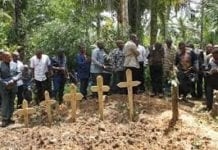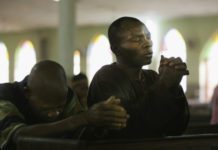>Christians concerned about future
>Sons also expecting verdict
>Death sentence would have been possible
By BosNewsLife Middle East Service with reporting by BosNewsLife’s Stefan J. Bos

CAIRO, EGYPT (BosNewsLife)– A court in Egypt on Saturday, June 2, sentenced ex-President Hosni Mubarak to life in prison for involvement in the killing of over 800 demonstrators during last year’s uprising. He leaves behind a divided nation where minority Christians have expressed concerns about their future, amid growing influence of hardline Islamists.
The 84-year-old former leader could have faced the death penalty, but the court eventually decided differently. Witnesses said the ruling in a packed room of the police academy in Egypt’s capital Cairo was welcomed with shouts of joy and fireworks.
Soon after the announcement Mubarak reportedly suffered a heart attack on the way to prison, but was later in stable condition, prison officials said. His two sons and six former police officials were acquitted of corruption charges, while a former Interior minister under Mubarak also received life imprisonment.
There were massive security measures and Arabic television channel Al Jazeera counted some 20,000 security forces and over 150 tanks in the neighborhood.
The sentence for a man who ruled the nation with an iron fist for three decades surprised Egyptians. Mubarak, a former air force officer, was forced to leave amid massive pro-democracy protests in what became known as the Arab Spring.
He was eventually prosecuted on charges that included alleged complicity in shooting to death up to 850 protesters and corruption.
HEALTH CONCERNS
The trial was often interrupted because of what he said was his poor health.
News reports initially said he was in a coma following his forced resignation. He was even brought to a hearing while laying on a hospital bed.
Verdicts were also expected against Mubarak’s two sons,former Interior Minister Habib El Adly and a handful of other regime officials.
Mubarak is the second Arabic leader to be sentenced following the sentencing of 75-year-old former Tunisian President Zine-al Abidine Bel Ali, who fled the nation.
Libyan leader Muammar Gaddafi was killed in October 2011 in an uprising there.
CHRISTIANS UNCERTAIN
Yet, in Egypt, Christians have made clear they remain concern about their future following the outcome of recent elections.
The Muslim Brotherhood’s candidate and a veteran of ousted leader Hosni Mubarak’s autocratic regime will face each other in a runoff election on June 16-17 for Egypt’s president, according to first-round result.
The face-off between the Brotherhood’s Mohammed Morsi and former air force chief and prime minister Ahmed Shafiq is seen by critics as a throwback to a rivalry between a military-rooted strongman promising a firm hand to ensure stability and Islamists vowing to implement religious law.
“The Arabs [have been] hijacked by the Muslim Brotherhood [party] and the Salafists,” said Priest Rafic Greiche, chief press spokesman of the Greek Melkite Catholic Church in Cairo, the capital, in recent remarks.

Following earlier parliamentary elections, the hard-line Salafist Muslims of the Nour Party already became the second largest political force in the country. They espouse a strict form of Islam similar to that practiced in Saudi Arabia, where security forces are known to have raided underground church groups.
HATRED ATMOSPHERE
That has contributed to an atmosphere of hatred on several occasions towards Christians, also known as Copts, who comprise some 10 percent of Egypt’s 80-million mainly Muslim population, according to Christians.
Dozens of Christians were killed and hundreds injured since last year, for instance in demonstrations against the destruction of churches.
On Monday, May 21, an Egyptian court sentenced 12 Christians to life imprisonment and acquitted eight Muslims over religious tensions last year in the country’s south.
The Christians were found guilty of sowing public strife, the possession of illegal weapons and shooting dead two Muslims in April of last year in Minya province, about 220 kilometers (135 miles) south of Cairo, trial observers said
Tensions in April 2011 reportedly began after a Muslim bus driver became angry over a speed bump outside the home of a wealthy Coptic attorney and instigated a crowd, brandishing weapons, to assist him in removing it.
Fearing an imminent attack, at least one guard at the house began to shoot, killing two Muslims and injuring two others, according to rights investigators.
UNFAIR TRIAL?
Christian Solidarity Worldwide (CSW), a major advocacy group, recently said that while “there is no question that the guilty should be punished, there remain worrying indications that the twelve men may not have received due legal process” for the Christians.
As civilians, he said “they should not have been brought before a military tribunal.” Additionally, “the unequal application of justice in this case is an unfortunate illustration of how Egyptian Christians are not treated equally under the law.”
There have also been reports of detentions of other Christians and activists on charges of blasphemy against Islam.
Christians, who are also known as Copts, comprise roughly 10 percent of Egypt’s 80-million mainly Muslim population, according to several estimates.








